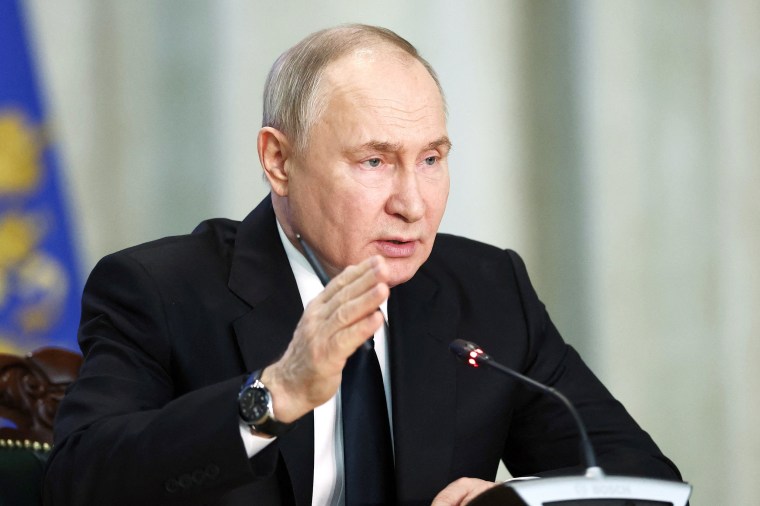The Kremlin has embraced a challenge in the wake of last week’s deadly terror attack in Moscow: pinning the blame on its enemies.
Russian officials have stepped up their efforts to point the finger at Ukraine and the West — a task made more difficult by a lack of publicly presented evidence, denials by Kyiv matched by claims of responsibility by the Islamic State terrorist group, and contradictions in the narrative put forth by the Kremlin’s hawks.
Although President Vladimir Putin offered early hints of the claim that Ukraine was in some way involved in the concert hall attack, the Russian leader and his propaganda machine have doubled down on those claims in recent days. The head of the country’s Federal Security Service (FSB) even suggested Tuesday that it was not just Kyiv but the United States and Britain that were behind the attack, which has now claimed at least 140 lives.
Ukraine and its allies have dismissed the accusations, while the U.S. has said ISIS was solely responsible for the attack.
Four Tajik nationals charged in the attack appeared severely beaten in a Moscow court Sunday, raising questions about how reliable any testimony they give will be. On Monday, Putin admitted for the first time that the attack had been carried out by “radical Islamists,” while again suggesting that Ukraine was involved.

FSB chief Alexander Bortnikov took it further Tuesday and said that “primary data” received from the suspects so far points to a “Ukrainian trace” because “the Islamists alone were unable to prepare such an act.” Bortnikov also accused Kyiv of training militants in the Middle East.
His words were echoed by another high-ranking official in Putin’s entourage Tuesday: the secretary of Russia’s National Security Council, Nikolai Patrushev. “Of course, Ukraine,” Patrushev said, answering a question from a journalist about whether ISIS or Kyiv was to blame for the attack.
But the Kremlin accusations, while increasingly definitive, have lacked any evidence, details or clarity.
“Overall, there’s an odd disconnect. The official line, that Ukrainians recruited jihadists, is being parroted, but often with little conviction,” Mark Galeotti, head of the consultancy Mayak Intelligence and an honorary professor at University College London, wrote on X. “Despite talk of consequences, nothing is really emerging, leaving the authorities looking rather weak.”
Russian propaganda has dismissed the ISIS claim of responsibility since the night of the attack, when observers feared that the Kremlin might seek to exploit the situation by blaming its enemies in Ukraine and the West.
That has been borne out in the days since.
On Wednesday, the pro-Kremlin newspaper Argumenty i Fakty splashed across its front page the faces of President Joe Biden, Ukrainian President Volodymyr Zelenskyy and the leaders of Germany, France and the United Kingdom against the burning Crocus concert hall in the background, with a tagline that read: “We know the masterminds of the terrorist attack in Crocus. … Let them tell each other the nonsense about ISIS.”
When asked why Zelenskyy, who is Jewish, would be in league with Islamist extremists, Kremlin spokesperson Dmitry Peskov suggested it was not so far-fetched. The Ukrainian leader is a “peculiar” Jewish person who sympathizes with Nazis, Peskov said Tuesday, resorting to the Kremlin’s baseless trope about Zelenskyy and his government.
Russia’s Investigative Committee also said Wednesday that it would look into an appeal by several lawmakers to investigate how the U.S. and other Western countries are allegedly organizing, financing and carrying out terror acts against Russia.
Pushing that narrative could serve several purposes.
It detracts from any meaningful discussion about the failure of Russia’s own security services, which have been busy cracking down on domestic dissent and seemingly missed an attack that was clearly well planned and that the U.S. had warned about weeks in advance.






